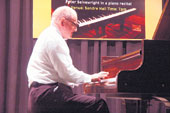 |
| HAVE PIANO, WILL PLAY: Peter Seivewright performs at Calcutta School of Music |
Peter Seivewright, if his commitment to his craft is any indication, will surely agree with new-age pianist Michael Jones who said, “I sense that the instrument is alive — that when I listen closely for nuance and tone, the inanimate world of strings, wood, pins and steel comes to life. When I honour the piano’s vitality and complexity, I can’t tell whether I am playing the piano or it is playing me.”
Indeed, this recitalist extraordinaire exuded with growing intensity a “have piano, will play’’ mindset during his performance at the Calcutta School of Music, under the aegis of The British Council on October 20.
Flagging off with Bach’s Prelude and Fugue in D major, the former Oxonian did very little to veil his humility and did a lot to neatly thread the piece with virtuosic manouevring, some persuasive phrasings in a composition where melody fell short of playing the pivot. And from a wistful start, Seivewright followed it with a choice that not only told of his experience but also his innate confidence — Liszt’s Variations on “Weinen, Klagen’’.
Liszt, who is said to have made a veritable bedfellow out of the piano, ensured most of his pieces glorified this life-long enterprise. And by opting to play this composition, Seivewright, for his part, exhibited not only his ceaseless quest for self-enrichment and enormity of repertoire, but far more starkly, versatility. Being quite the chameleon, Seivewright traversed through a slew of flamboyant tones and differing pitches with the felicity one would expect of someone who has wowed audiences from places as varied and culturally distinct as Ireland and Kuwait.
Small wonder, he was equally adept at extracting the emotive content and light-footed rhythm in Rachmaninoff’s Prelude in B flat major optimally. Again, his ability to arbitrarily prolong or truncate notes and the sporadic deviation from the original tempo was just as evident when he chose the duke of the rubato, Moszkowski’s Etude in A flat major.
Seivewright is soon to record a 10 compact disc series featuring all 90 sonatas of Baldasarre Galuppi, the enigmatic Venetian composer who had won the encomium of being “a fertile genius, spreading treasures of taste, sensitivity and imagination’’ and of whom a gratified yet befuddled Robert Browning had written:
“Oh, Galuppi, Baldassaro, this is very sad to find! I can hardly misconceive you; it would prove me deaf and blind; But although I give you credit, ‘tis with such a heavy mind !...’’
And if Seivewright’s deftness at reproducing a kedgeree of feelings — teary one moment, teasing the next — in a remarkable rhythmic carnival during Chopin’s Piano Sonata in B minor is any index, his espousal of Galuppi’s oeuvre could compel Browning to change his mind.











